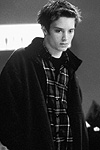
Features:
Photo Encounters |
Forum
FAQ |
Disclaimer |
35 visitors online.
Contact Us:
Deenan |
Lucy |
Brenda
Skins:
Faces | Raindrops | Spring Clean



 |
FOLLOW A&F ON TWITTER
|
|
|

|
BLACK AND WHITE (1999)
|

Wren
I think that in making Black and White director James Toback took all of the ideas he had and threw them up into the air with his eyes closed and fingers crossed, hoping to God that they somehow land in the right place. Indeed, the pieces fit together like a jigsaw puzzle. The film is about a lot of things and all of them are prevalent in one way or another. With such a maddeningly large array of themes and subjects, it's mighty impressive that Black and White works as well as it does. And yet instead of visualizing a cinematic genius intricately crafting a complex work of art, the image I got from watching the movie was that of Toback, sleep-deprived and haggard, desperately attempting the Herculean task of putting together a magnum opus in 15 minutes and miraculously succeeding.
There are a lot of overlapping storylines here and in its plotting, the film resembles a (deliberately?) disorganized version of Magnolia or Cradle Will Rock. It is being sold as a look at white people obsessed with black culture, but that is only one of the stories. It involves a documentary filmmaker (Brooke Shields) shooting a film about the subject, the group of kids (including a convincing Elijah Wood and Bijou Phillips) who are her focus and her husband (Robert Downey Jr.), who is obviously gay even though his wife doesn't seem to realize it.
There is also the story of a star college point guard (real basketball player Allan Houston), who is approached by a policeman (Ben Stiller) posing as a gambler. His proposition: throw the upcoming game and get $50,000 cash. The purpose of this maneuver is to set the nice but gullible kid up and then blackmail him into ratting out one of his buddies who is the head of a gang. The policeman also approaches the district attorney whose son is involved with the gang leader with a different sort of proposal. And then there is Mike Tyson who, playing himself, is funny just by showing up.
Aware that a conventional filmmaking method for such unconventional subject matter wouldn't do, Toback decided to let the actors improvise a lot of their scenes. He gave them a general direction in which to head, turned on the camera and let them do their thing. The result is exactly what he was aiming for: the scenes have a flowing, unforced feel to them. It doesn't feel like we're watching a documentary but rather a movie that genuinely reflects real life. And anyway, no movie in which Mike Tyson gets to say "This is what I'm deciphering from your vernacular" can be all bad.
The surprise here is Allan Houston who has a real affability and screen presence. Unlike fellow basketball-star-cum-thespian Shaquille O'Neal, Houston may have a real career in store for himself if he chooses to use his talent wisely and not accept projects trying to exploit his basketball stardom. In Black and White, Houston's troubled point guard is the only character I liked as a person.
Not everything works. Not every theme comes through loud and clear. The Ben Stiller character gets a lot of screen time and the movie makes a big deal out of him but he's never really explored and we struggle to understand him. In the end, Black and White works as a gritty slice-of-life movie, not trying to say anything concrete but simply to show. A lot is thrown on the screen and most of it hits home.
********
With an onslaught of race and ethnic-themed films at theaters, it's often hard to tell which have serious morals and which are pure fluff driven by the traditional Hollywood economy. Black and White takes the former approach by asking serious questions about relations between African American and Caucasian populations in urban settings.
Several stories weave through this surprisingly short film (100 minutes wouldn't seem especially brief, except that this film tries to accomplish an awful lot in that modest amount of time). The primary story centers on gang leader and soon-to-be rap star Rich (Oliver "Power" Grant) whose greatest ambition is to record an album to promote racial harmony. A second storyline focuses on a group of white high school students who imitate the hip-hop culture and end up involved with the third storyline; that of a documentary filmmaker (Brooke Shields) and her gay husband (Robert Downey Jr.) who want to examine the effects of hip-hop on white culture and the rationale behind the mimicry. Then there's the story of a basketball player (Allan Houston) who's asked to throw a game in exchange for a few extra bucks, and his girlfriend (Claudia Schiffer) whose Master's thesis is more important than her relationship.
A bevy of talented and not-so-talented actors makes up this above-average ensemble that sometimes manages to keep us interested when the storytelling falters. Downey is a bit over the top, but Shields gives it her all as the feisty and pushy documentarian. Meanwhile, the actors playing the high school students have talent of their own. Most notable are long-time child star Elijah Wood, Eddie Kaye Thomas and Gaby Hoffman.
As for the film's optimistic theme about racial coexistence, it's difficult to buy the implication that hip-hop brings the races together. The impact of hip-hop is more than slightly exaggerated here; it simply doesn't touch as wide a range of subcultures as the filmmakers seem to think.
Black and White is an interesting movie that tackles important social issues. However, the film drags too much to keep an intelligent audience interested long enough to fully grasp its message, and even if they do, it might not be convincing.
|
| |
|
| |
|
|
|





